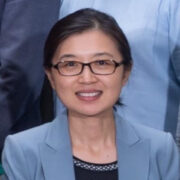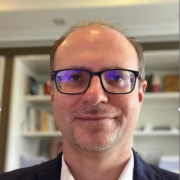Sustainable Transport Award

Cities worldwide have addressed climate change and equity issues by scaling sustainable transport and green infrastructure to improve access, equity, and resiliency. As challenges persist for walking, cycling, and public transport, however, cities need to rethink land use and infrastructure development approaches to adapt better and respond to environmental crises.
In this webinar, winners and applicants of the 2024 Sustainable Transport Award, including Tianjin, China; New York, USA; and Santiago, Chile, will share lessons from their efforts to implement sustainable mobility and green infrastructure solutions while also addressing issues like climate policy, adaptation, mode shift, behavior change, and more.
This event will feature live interpretations in Spanish, Portuguese, and Chinese.
Find more information on the Sustainable Transport Award at www.staward.org.
Past events in the 2023 STA Series:

Clarisse Cunha Linke is a Brazilian who has been involved in planning and implementing social policies and programs since 2001, with experience in Brazil, Mozambique, and Namibia. She holds a Masters in Social Policy, NGOs, and Development from the London School of Economics and Political Science (LSE), where she received the “Titmuss Examination Prize” in 2005.

Winnie Wang is a Lead Transport Specialist and Infrastructure Program Leader with the World Bank Group. Professionally trained in transport planning, she has led diverse operations including urban mobility, road connectivity, railway reforms and logistics improvements in three regions of the Bank. Winnie is also the co-lead of the Global Knowledge Group for Inclusive Urban Mobility and Accessibility.
Prior to joining the Bank, Winnie worked at the Washington Metropolitan Area Transit Authority for Metrorail planning, and Transport for London for intermodal transport planning with big data application. Winnie is a graduate of the Massachusetts Institute of Technology.

Margaux is the Assistant Director for Greenways in DOT’s Bicycle Unit. Margaux is responsible for the expansion of the City’s greenway network and is currently overseeing a major federal grant to plan new greenway corridors in the outer boroughs. Margaux also previously worked in DOT’s Capital Planning & Initiation division where she worked on scoping long-term street reconstruction and safety projects. Prior to joining DOT, Margaux was an associate at U3 Advisors, a real estate and economic development consulting firm where she advised clients in the higher-ed and non-profit sectors. Margaux holds a BA from Barnard College and a Masters of City Planning from the University of Pennsylvania. Outside of work, she has racked up over 2,500 CitiBike miles.

Ted Wright is the director of New York City’s Bicycle Program; the largest bike network in the United States. He has worked for over 25 years in both the public and private sectors on long-range, open space and strategic planning. He has led the charge in protected lane development in NYC and is proud of being in charge of
the Bike Unit as expectations grew from 10 miles of protected bike lanes a year to the exciting goal of 50 recently mandated by NYC City Council. Under his leadership, NYC has become a leader of protected path design, creating new street typologies used throughout the US. He has also spearheaded the use of implementation-focused planning studies within NYC, successfully integrating community groups into a rapid-response process showing immediate results while building momentum for longer-term, more expensive capital projects. He holds a Masters of Science in Urban Planning from Columbia University and earned a
Bachelor of Arts in Urban Studies from Rutgers College.

Gerald Ollivier is the Lead Transport Specialist for the World Bank in India. He focuses on developing solutions to enhance urban mobility, unlock markets for electric mobility, achieve sustainable economic integration through multimodal transport, and achieve safer transport to better serve the needs of India. Prior to India,
he was Cluster Leader in the Singapore World Bank Hub and led the World Bank Community of Practice on Transit Oriented Development. From 2010 to June 2018, he supported the development of metro lines and high-speed rail lines in China, as team leader for several World Bank projects. He led the preparation of the
Tianjin Urban Transport Improvement Project and the first three years of its implementation. From 1995 to 2010, he focused on World Bank trade and transport projects in Europe and Central Asia. He is a civil engineer and a chartered financial analyst.

Michel Carles works in the Regional Government of Santiago as Head of the Infrastructure and Green Areas Department. As an architect with more than 15 years of experience he is a Senior Project Manager committed to addressing social and environmental challenges. He has experience in strategic planning, urbanism, public space design, mobility, public policies, project management, international cooperation, and team leadership.

Dr. Jiang is the deputy director at China Sustainable Transportation Center (CSTC),
an independent think tank founded by the Energy Foundation. He has been
managing a variety of projects in Chinese cities, including transit-oriented
development, urban retrofits, non-motorized transportation system development,
and city carbon emissions evaluation. Mr. Jiang also conducts related research and
has published over 30 papers. On policy development, he has been a key expert
writing a number of guidelines and codes for the Chinese central government’s
ministries. Dr. Jiang received his PhD degree in urban planning from Tsinghua
University, dual master degree of city planning and science in transportation from
Massachusetts Institute of Technology, and bachelor degree of architecture from
Tsinghua University. He also holds a national urban planner certificate in China.